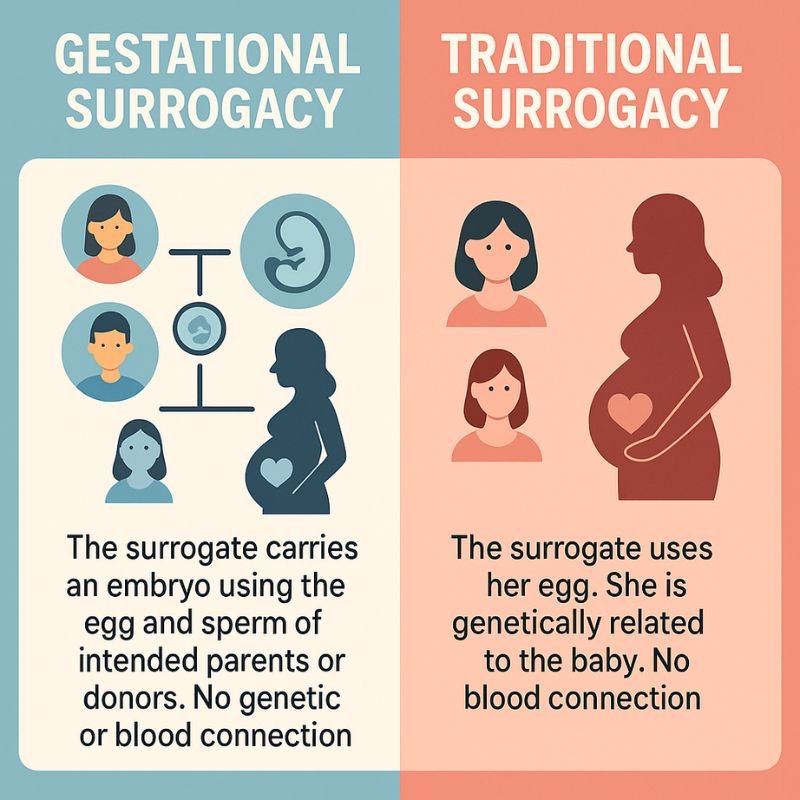Can a Surrogate Mother Share Blood with the Baby?

Surrogacy raises complex questions, especially about the biological connections between the surrogate mother and the baby. A common curiosity centers around the baby’s blood—does it mix with the surrogate’s? Does she contribute anything genetically or immunologically? The answer involves understanding how the placenta works, the fetal-maternal barrier, and the difference between gestational and traditional surrogacy.
What Happens Biologically During Surrogacy?
The placenta acts as the baby’s life support. It develops from the embryo, not from the surrogate’s tissue. While it connects to the surrogate’s uterus, it functions as a selective filter. Nutrients, oxygen, and waste products pass through—but not blood cells. This prevents blood mixing in most cases. This barrier lies at the interface between the baby’s blood vessels and the surrogate’s uterine lining. It allows the exchange of gases and nutrients without permitting direct blood contact. Only under specific, usually pathological, conditions would fetal and maternal blood mix.
Gestational vs. Traditional Surrogacy
Here’s a concise comparison of Gestational Surrogacy vs. Traditional Surrogacy:
Gestational Surrogacy
In gestational surrogacy, the surrogate carries an embryo created via IVF using the egg and sperm of intended parents or donors. The surrogate shares no genetic or blood connection. Her body hosts the pregnancy, but the baby’s genetic material remains from the egg and sperm providers.
Traditional Surrogacy
In traditional surrogacy, the surrogate uses her egg. She is genetically related to the baby. However, even in this case, blood does not mix. Her DNA is passed through the egg, not through blood during pregnancy.
Does the Baby Ever Receive Cells from the Surrogate?
Microchimerism is the presence of a small number of cells from one individual in another. In pregnancy, there’s evidence that fetal cells may enter the surrogate’s bloodstream and vice versa. However, these are immune cells or stem cells—not full blood exchange. Studies show a minimal transfer of surrogate cells into the fetal environment, but these do not result in shared blood. They may linger in organs or tissues for years, but the genetic identity of the baby remains unchanged.
Immune Tolerance in Surrogacy
The surrogate’s immune system recognizes the fetus as semi-foreign. The placenta suppresses immune responses to prevent rejection. This immune accommodation does not mean the surrogate’s blood enters the fetus it only allows peaceful coexistence.
Does Shared Environment Affect the Baby?
While the surrogate provides no DNA (in gestational surrogacy), she can influence gene expression. This process, called epigenetic modification, occurs via the intrauterine environment. Factors like diet, stress, and health can turn genes on or off in the developing fetus. The surrogate supplies all the nutrients and hormones the baby needs. These biochemical substances come from her blood but do not carry her blood cells into the fetus. They shape growth, but not the baby’s blood type or immune system identity.
Can Blood Mixing Occur Accidentally?
Conditions like placental abruption or trauma can rupture the fetal-maternal barrier. In such cases, small amounts of blood might cross. These situations are rare and usually managed carefully by obstetricians. If the baby and surrogate have different Rh factors, doctors monitor for sensitization. Yet, this again highlights the separation of blood systems. Only with barrier breaches does this become an issue.
How Surrogacy Affects Bonding and Health
Here’s a breakdown of how surrogacy may affect bonding and health
- The surrogate and baby do not share DNA or blood in gestational surrogacy.
- Physical closeness in the womb may create a temporary biological connection, such as hormonal signaling.
- This biological link ends after birth.
- Any emotional bond formed is due to psychological factors, not biological ties.
- Surrogates are usually psychologically prepared to avoid forming lasting emotional attachments.
- Babies born via surrogacy show no long-term negative health effects linked to being carried by a surrogate.
- Since there is no shared blood, issues like immunological imprinting or genetic drift are not a concern.
- Health outcomes are similar to those of babies born through traditional pregnancies, especially with high-quality prenatal care.
- The child’s health is more influenced by genetics, environment, and postnatal care than by the surrogacy process.
The Importance of Medical Protocols
Surrogacy agencies screen surrogates for blood-borne diseases to protect the baby. Although no blood is shared, this step ensures a safe pregnancy environment. Delivery protocols include monitoring for any cross-contamination risks. In cases where a cesarean delivery is necessary, managing C Section pain becomes an important part of postnatal care for the surrogate. Newborns are tested, but rarely do they show signs of surrogate-cell influence. Medical professionals ensure clear boundaries are maintained.
Scientific Advancements in Surrogacy
Research into artificial wombs may one day replace surrogacy. These systems would remove the question of surrogate blood entirely. Until then, modern science keeps fetal and surrogate systems mostly independent. Advanced tools allow parents to map not just genes but epigenetic influences. This helps separate surrogate effects from inherited traits more clearly.
Legal and Ethical Rules
In gestational surrogacy, the parents who gave the egg and sperm are the legal parents. The surrogate doesn’t have a blood or legal tie to the baby. Doctors follow rules to protect both the baby and the surrogate. They keep all health checks and treatments clear and safe.
Clearing Misconceptions About Blood Sharing in Surrogacy
A surrogate mother does not share blood with the baby. The body’s natural design maintains a distinct separation through the placenta and fetal-maternal barrier. Even in traditional surrogacy, where the surrogate is genetically related, no blood-sharing occurs. Instead, pregnancy becomes a physical support system nurturing the baby without merging identities. Understanding this boundary clears misconceptions and highlights the scientific sophistication of modern surrogacy.
FAQs
Can a surrogate’s blood type affect the baby?
Does the baby inherit any traits from the surrogate?
Is there a chance of the surrogate passing on diseases?
Does the baby get antibodies from the surrogate?
Can the surrogate’s diet affect the baby?

Aashley Kai is the Editorial Director of Chelsea Famous Parenting and a licensed expert in early childhood education. She holds a Master’s in Child Psychology from the University of Texas Southwestern Medical Center and has worked as a preschool teacher and child therapist. Since joining in 2024, Aashley has been dedicated to creating well-researched, trustworthy parenting resources. Her work helps parents and caregivers foster nurturing, educational environments for children. Outside of work, she enjoys hiking and photography, capturing nature from a child’s perspective.




